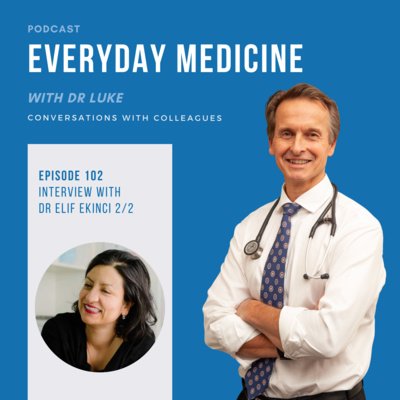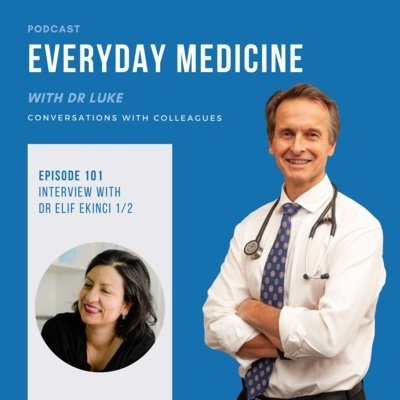Episode 129. Epigenetics and Pancreatic Insulin Regeneration with Dr Ishant Khurana
Recently a team from the Monash Department of Diabetes published in the Nature Journal ‘ Signal Transduction and Targeted Therapy ‘ how their research could lead to the regeneration of insulin in pancreatic stem cells. As their findings could potentially benefit the 130,000 Type I diabetics in Australia and 30 per cent of Type II diabetics who are insulin dependent it received significant media attention. Diabetes is the fastest-growing illness in Australia and about 500 million people have diabetes worldwide with the potential complications of cardiovascular disease, renal failure, cerebrovascular disease, neuropathy, retinopathy, and lower limb amputation.
Associate Professor Neale Cohen who is the director of diabetes clinical research at the Baker Heart and diabetes institute believes the research shows great potential. Currently, the research is being conducted by a carefully selected team lead by Professor Sam El-Osta and including Dr Ishant Khurana and Dr Al-Hasani and we will be discussing their work and objectives further with Ishant in this podcast.
The research has discovered how to reawaken stem-like cells in the diabetic pancreas. Using an inhibitor of the protein called EZH2 which induces histone H3 lysine 27 trimethylation that functions to silence the insulin gene, insulin expression may be reawakened. If successful, the research will not only lead to a method for avoiding islet cell transplantation but possibly the need for exogenous insulin therapy altogether which is very exciting.
I was curious to have this research explained in more detail and to discover how close the investigative team were to success using these groundbreaking epigenetic strategies.
Please join me in welcoming Dr Ishant Khurana to the podcast.
References:
Dr Ishant Khurana: https ://research.monash.edu
Twitter: https://twitter.com/IshantKhuranaAU
Nature journal, Signal Transduction and Targeted Therapy titled: Inhibition of pancreatic EZH2 restores progenitor insulin in T1D donor. DOI: 10.1038/s41392-022-01034-7
Recently a team from the Monash Department of Diabetes published in the Nature Journal ‘ Signal Transduction and Targeted Therapy ‘ how their research could lead to the regeneration of insulin in pancreatic stem cells. As their findings could potentially benefit the 130,000 Type I diabetics in Australia and 30 per cent of Type II diabetics who are insulin dependent it received significant media attention. Diabetes is the fastest-growing illness in Australia and about 500 million people have diabetes worldwide with the potential complications of cardiovascular disease, renal failure, cerebrovascular disease, neuropathy, retinopathy, and lower limb amputation.
Associate Professor Neale Cohen who is the director of diabetes clinical research at the Baker Heart and diabetes institute believes the research shows great potential. Currently, the research is being conducted by a carefully selected team lead by Professor Sam El-Osta and including Dr Ishant Khurana and Dr Al-Hasani and we will be discussing their work and objectives further with Ishant in this podcast.
The research has discovered how to reawaken stem-like cells in the diabetic pancreas. Using an inhibitor of the protein called EZH2 which induces histone H3 lysine 27 trimethylation that functions to silence the insulin gene, insulin expression may be reawakened. If successful, the research will not only lead to a method for avoiding islet cell transplantation but possibly the need for exogenous insulin therapy altogether which is very exciting.
I was curious to have this research explained in more detail and to discover how close the investigative team were to success using these groundbreaking epigenetic strategies.
Please join me in welcoming Dr Ishant Khurana to the podcast.
References:
Dr Ishant Khurana: https ://research.monash.edu
Twitter: https://twitter.com/IshantKhuranaAU
Nature journal, Signal Transduction and Targeted Therapy titled: Inhibition of pancreatic EZH2 restores progenitor insulin in T1D donor. DOI: 10.1038/s41392-022-01034-7
Episode 102. What's new in Diabetes with Dr Elif Ekinci (Part 2)
In the last 12 months, 121,000 Australians were diagnosed with diabetes, this statistic represents a 7% increase from the preceding year. There are now over 1.236 million Australians with type 2 diabetes and over 129,000 with type 1 diabetes and about 50,000 Australians have gestational diabetes each year -these staggering figures mean that 332 new diagnoses occur each day, about one new case every 5 minutes.
In respect to type 2 diabetes, the metabolic syndrome secondary to the obesity epidemic would appear to be a major contributor to new diagnoses. Australia ranks 6th highest amongst OECD countries (Organisation for Economic Cooperation and Development) in relation to its overweight and obese citizen with 67% characterised as overweight or obese (36% overweight, 31% obese).
In the last 12 months, 121,000 Australians were diagnosed with diabetes, this statistic represents a 7% increase from the preceding year. There are now over 1.236 million Australians with type 2 diabetes and over 129,000 with type 1 diabetes and about 50,000 Australians have gestational diabetes each year -these staggering figures mean that 332 new diagnoses occur each day, about one new case every 5 minutes.
In respect to type 2 diabetes, the metabolic syndrome secondary to the obesity epidemic would appear to be a major contributor to new diagnoses. Australia ranks 6th highest amongst OECD countries (Organisation for Economic Cooperation and Development) in relation to its overweight and obese citizen with 67% characterised as overweight or obese (36% overweight, 31% obese).
In this podcast, I was curious to explore how our society might stem the increasing number of cases that are contributing to the major public health epidemic we are facing. Is a sugar tax warranted for example as has been introduced in the United Kingdom? Do we need more health campaigns explaining what a healthy lifestyle and eating plan should look like?
From the pharmacological perspective we are fortunate in having some relatively new and effective drugs added to our therapeutic armamentarium available to tackle type 2 diabetes and these have opened up some exciting new management possibilities with impressive outcomes.
In this conversation with Associate Professor Ekinci, I was keen to understand the place of all these new medications in treatment strategies and the target haemoglobin A1C clinicians should be aiming for.
I was also keen to discuss when insulin should be added to manage type 2 diabetes noting that 40 to 50% of Beta cell function is lost by the time of diagnosis and it is estimated that a further 4-5% of function is lost each subsequent year.
Another exciting line of conversation I had hoped to explore related to new initiatives in the management of type one diabetes in relation to continuous glucose monitoring which in the lead-up to the federal election both major political parties have made firm commitments to support.
Assoc Professor Elif Ekinci is the Sir Edward Dunlop Principal Research Fellow in Medicine at Austin Health and the Dame Kate Campbell Fellow at the University of Melbourne. Elif is a clinician-researcher and an academic endocrinologist who is working to translate research into improved outcomes for people with type one and type 2 diabetes. Her research is focused on the pathophysiology, prevention, detection and treatment of diabetes and its complications through mechanistic studies, observation studies and clinical trials. Elif has received multiple awards for her work in diabetes and is clearly on a stellar career trajectory. It was an incredible privilege to have this conversation with her. Please welcome Assoc Prof Elif Ekinci to the next two episodes.
References:
Assoc Professor Elif Ekinci-Endocrinology Melbourne-www.endocrinologymelb.com.au
Diabetes-Australian Institute of Health and Welfare: www.aihw.gov.au
www.uptodate.com
Episode 101. What's new in Diabetes with Dr Elif Ekinci (Part 1)
In the last 12 months, 121,000 Australians were diagnosed with diabetes, this statistic represents a 7% increase from the preceding year. There are now over 1.236 million Australians with type 2 diabetes and over 129,000 with type 1 diabetes and about 50,000 Australians have gestational diabetes each year -these staggering figures mean that 332 new diagnoses occur each day, about one new case every 5 minutes.
With respect to type 2 diabetes, the metabolic syndrome secondary to the obesity epidemic would appear to be a major contributor to new diagnoses. Australia ranks 6th highest amongst OECD countries (Organisation for Economic Cooperation and Development) in relation to its overweight and obese citizen with 67% characterised as overweight or obese (36% overweight, 31% obese).
In the last 12 months, 121,000 Australians were diagnosed with diabetes, this statistic represents a 7% increase from the preceding year. There are now over 1.236 million Australians with type 2 diabetes and over 129,000 with type 1 diabetes and about 50,000 Australians have gestational diabetes each year -these staggering figures mean that 332 new diagnoses occur each day, about one new case every 5 minutes.
With respect to type 2 diabetes, the metabolic syndrome secondary to the obesity epidemic would appear to be a major contributor to new diagnoses. Australia ranks 6th highest amongst OECD countries (Organisation for Economic Cooperation and Development) in relation to its overweight and obese citizen with 67% characterised as overweight or obese (36% overweight, 31% obese).
In this podcast, I was curious to explore how our society might stem the increasing number of cases that are contributing to the major public health epidemic we are facing. Is a sugar tax warranted for example as has been introduced in the United Kingdom? Do we need more health campaigns explaining what a healthy lifestyle and eating plan should look like?
From the pharmacological perspective, we are fortunate in having some relatively new and effective drugs added to our therapeutic armamentarium available to tackle type 2 diabetes and these have opened up some exciting new management possibilities with impressive outcomes.
In this conversation with Associate Professor Ekinci, I was keen to understand the place of all these new medications in treatment strategies and the target haemoglobin A1C clinicians should be aiming for.
I was also keen to discuss when insulin should be added to manage type 2 diabetes noting that 40 to 50% of Beta cell function is lost by the time of diagnosis and it is estimated that a further 4-5% of function is lost each subsequent year.
Another exciting line of conversation I had hoped to explore related to new initiatives in the management of type one diabetes in relation to continuous glucose monitoring which in the lead-up to the federal election both major political parties have made firm commitments to support.
Assoc Professor Elif Ekinci is the Sir Edward Dunlop Principal Research Fellow in Medicine at Austin Health and the Dame Kate Campbell Fellow at the University of Melbourne. Elif is a clinician-researcher and an academic endocrinologist who is working to translate research into improved outcomes for people with type one and type 2 diabetes. Her research is focused on the pathophysiology, prevention, detection and treatment of diabetes and its complications through mechanistic studies, observation studies and clinical trials. Elif has received multiple awards for her work in diabetes and is clearly on a stellar career trajectory. It was an incredible privilege to have this conversation with her. Please welcome Assoc Prof Elif Ekinci to the next two episodes.
References:
Assoc Professor Elif Ekinci- Endocrinology Melbourne-www.endocrinologymelb.com.au
Diabetes-Australian Institute of Health and Welfare: www.aihw.gov.au
www.uptodate.com



